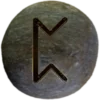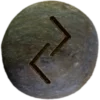Last Updated on September 28, 2024

In Asatru, a querent refers to someone seeking guidance or answers, particularly during rune readings or divination rituals. The word comes from the Latin quaerens, meaning “one who seeks or asks.” In Asatru, it applies to individuals asking specific questions, whether about personal challenges, spiritual concerns, or larger life issues. The querent seeks understanding of their path or fate, and runes serve to reveal hidden truths or insights from the gods, ancestors, or spirits.
While the term is more often associated with tarot or other divination systems, it has a strong place within Asatru’s rune casting traditions. Runes, like the tarot, carry symbolic messages that guide them toward a better understanding of their situation. Runes respond to the querent’s intent, offering insights based on their question and the specific runes drawn during the reading. A knowledgeable rune reader acts as a bridge between the querent and the ancient wisdom of the runes.
The Role of the Querent in Rune Readings
In Asatru, the querent plays an active role in the process of rune divination. The querent asks a question or seeks clarity, but they must also be open to the guidance the runes provide. Runes are seen as ancient symbols connected to fate, or Wyrd, and provide windows into what may come. For the them, understanding these runes can mean gaining insights into decisions or paths they have not yet considered.
One rune connects to the concept of a querent, Perthro. In the Elder Futhark, Perthro symbolizes mystery, fate, and the unfolding of hidden events. This makes it a fitting symbol for the querent, as it suggests that answers are not always clear or direct, but hidden and waiting to be discovered. The querent’s role in the Asatru tradition is to approach the runes with intention and seek the knowledge needed to navigate their life journey.

